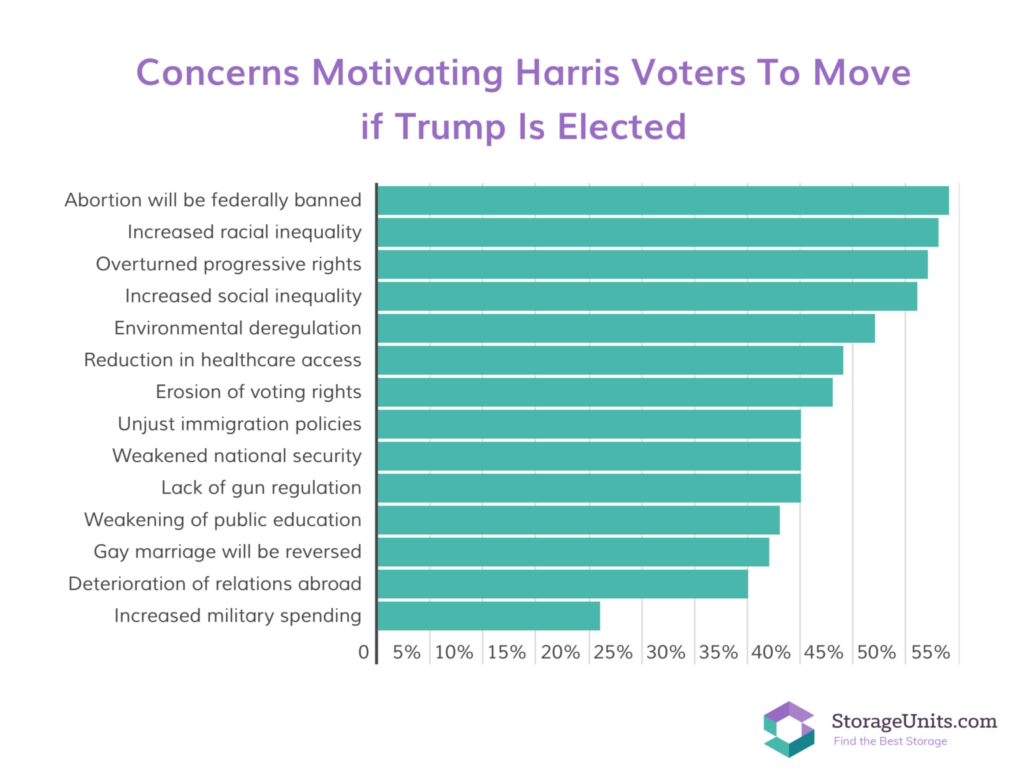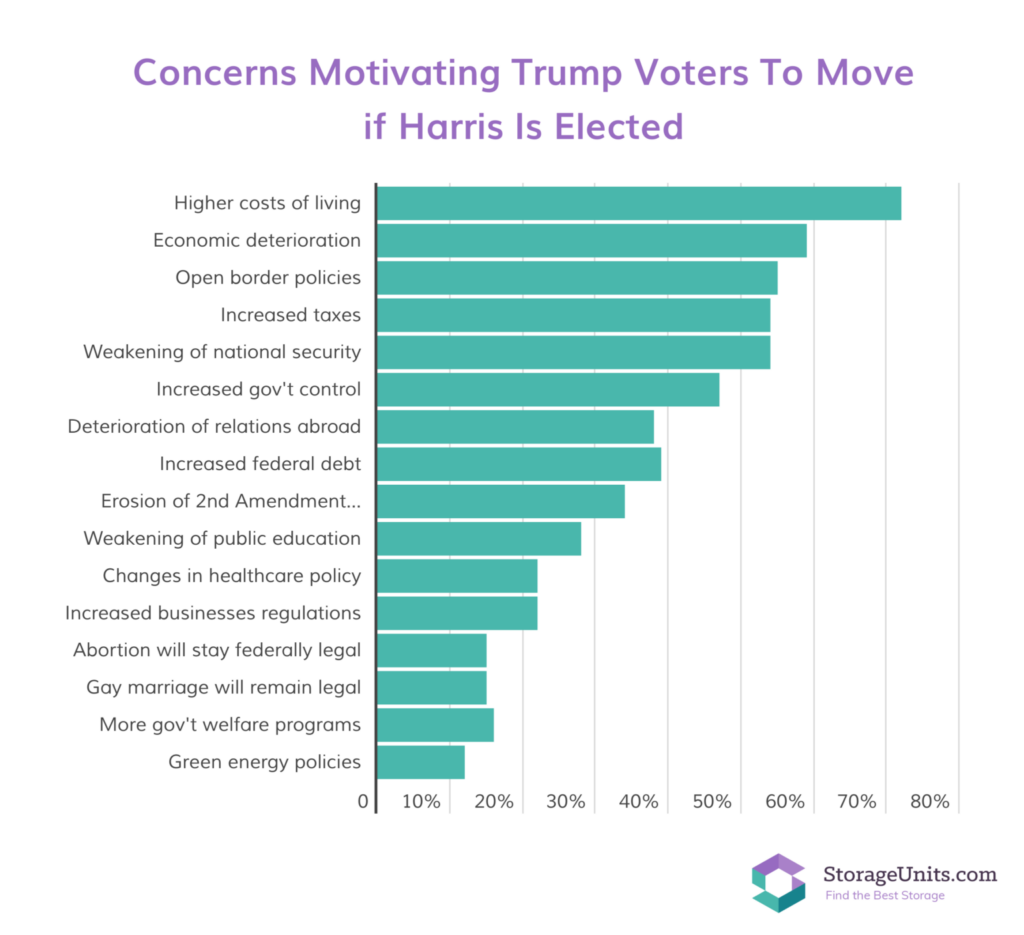In order to determine how likely Americans are to relocate if their preferred candidate they support loses, StorageUnits.com polled Americans before the election who intend to vote for either former President Donald Trump or Vice President Kamala Harris in the 2024 presidential election.
Key Findings:
- In the event that their preferred candidate loses, some 34% of Americans say they would like to move.
- In the event that their preferred candidate loses, about 54% of Gen Zers wish to relocate.
- Compared to 30% of males, some 36% of women would like to move.
- Harris voters who will relocate if she loses are most concerned about a federal abortion ban, increased racial inequality, and overturning of progressive rights.
- Trump voters who will relocate if he loses are most concerned about the higher cost of living, economic deterioration, and open border policies.
Four Out of 10 Harris Voters Want to Relocate if She Loses
If Trump is elected, some 2% of Harris voters will undoubtedly move to a different state or nation, and 4% most likely will. An additional 34% would like to move, but 20% are likely to do so, and 14% are certain they won’t.
The top three states that respondents are thinking about relocating to are Georgia (9%), Texas (9%), and California (14%) if Trump wins the election.
Canada (33%) and the United Kingdom (23%) are the top two nations that respondents are thinking about relocating to in the event that Harris loses the presidential election.

Harris voters particularly concerned about abortion, racial injustice, and the reversal of progressive rights.
According to respondents, the possibility of a federal abortion ban (54%), more racial inequality (53%), and the reversal of progressive rights (52%), are the main reasons they think about relocating if Kamala Harris loses and Donald Trump wins.
Reduced access to healthcare (44%), environmental deregulation (47%), and rising social inequality (51%), are additional major worries.
“The division within the United States has become increasingly pronounced in recent years,” said Real Estate Expert James Heartquist. “This polarization is evident in the way people are aligning themselves with political ideologies, often to the extent of considering relocation. The reasons for this division are multifaceted, including differing views on social issues, economic policies, and governance styles. This polarization is not just a political phenomenon but also a social one, affecting how communities interact and how individuals perceive their place within the country.”
One in Four Trump Supporters Plan to Move if Harris Wins Election
If Harris is elected, 3% of Trump voters will undoubtedly and 3% likely will move to a different state or nation. An additional 21% would like to move, but either 12% or 9% are certain they won’t. If Harris is elected, the top three states that respondents are thinking about relocating to are Florida (18%), Texas (13%), and Tennessee (12%).
Canada (32%) and the United Kingdom (23%) are the top two nations that respondents are thinking about relocating to in the event that Trump loses the election.

“The stakes of the 2024 election are incredibly high.” Heartquist said. “The outcome will shape the country’s direction on critical issues such as climate change, healthcare, immigration, and economic inequality. The polarization is so intense that some Americans are willing to uproot their lives to live in a place that aligns more closely with their political beliefs. This election is not just about choosing a leader but about deciding the future trajectory of the nation. The policies and decisions made by the next administration will have long-lasting impacts on various aspects of life, including the economy, social justice, and international relations.”
If Harris wins, Trump voters’ top concerns will be immigration and the economy.
Higher living expenses (72%), economic decline (59%), and open border policies (55%), are the main reasons why respondents say they would think about relocating if Donald Trump loses and Kamala Harris wins.
The deterioration of national security (54%), higher taxation (54%), and greater government control over private life (47%), are other major worries.
Gen Zers Most Likely to Desire Relocation
Even if they admit it might not be possible, Gen Z is the generation most likely to be planning a move or to ideally desire to move.
If their favorite candidate loses, males are marginally more likely than women to be planning a relocation, but women are more likely to say they want to move but know they can’t or won’t.
There is a similar trend among Trump and Harris supporters: Trump supporters are more likely to indicate that they will move if he loses, either certainly or probably, whereas Harris supporters are more likely to say that they would like to move in theory but probably won’t.

Personal Finances & Employment Prospects Preventing Some from Relocating
A number of variables are preventing Americans who have stated a wish to relocate from actually doing so.
Personal finances (62%), emotional or personal tie to their existing place (36%), and dubious employment prospects in a new place (34%), are the main contributing factors. Other important factors include being close to children (32%), needing healthcare access or coverage (26%), and being close to aging parents (24%).
Of those who are thinking of relocating in the event that their candidate of choice is not elected, 43% have looked into purchasing a storage unit, and 15% have actually done so.
“The real estate market is likely to be significantly impacted by this political migration,” Heartquist said. “First, we can expect regional shifts in population as people move to states that align with their political views. This could lead to increased demand in certain areas and decreased demand in others, potentially driving up property prices in politically favorable regions. Secondly, election years often bring uncertainty, which can lead to a temporary slowdown in the real estate market. Buyers and sellers may hesitate to make significant financial decisions until the political landscape is clearer. Lastly, policy changes proposed by presidential candidates can influence market sentiment. For example, changes in tax laws or housing regulations can affect home affordability and investment decisions.”
To read the full report, including more data, charts, and methodology, click here.






